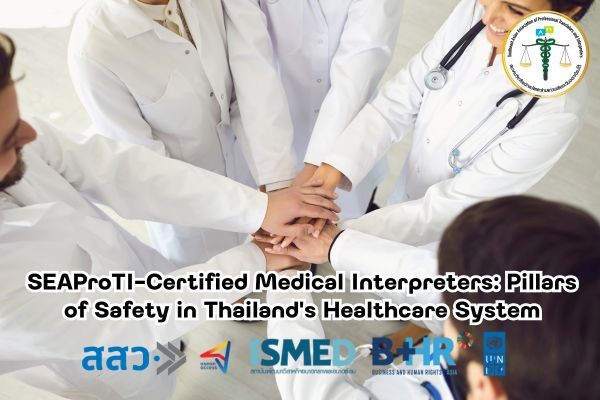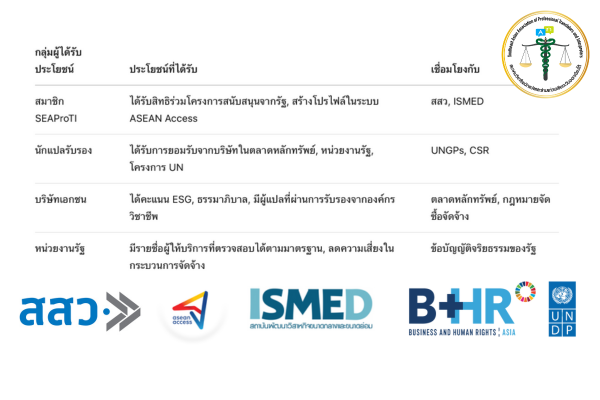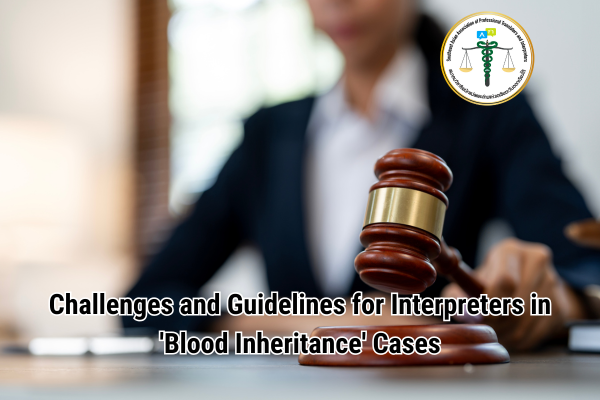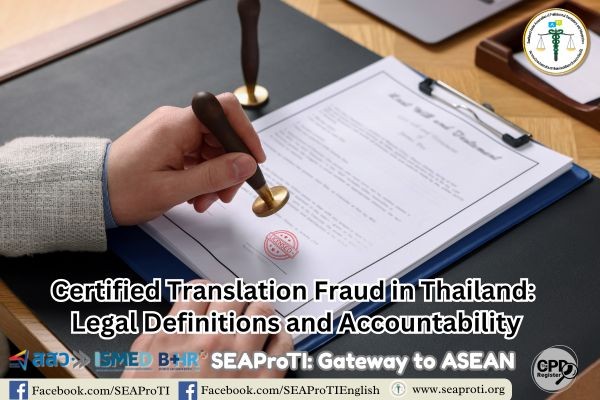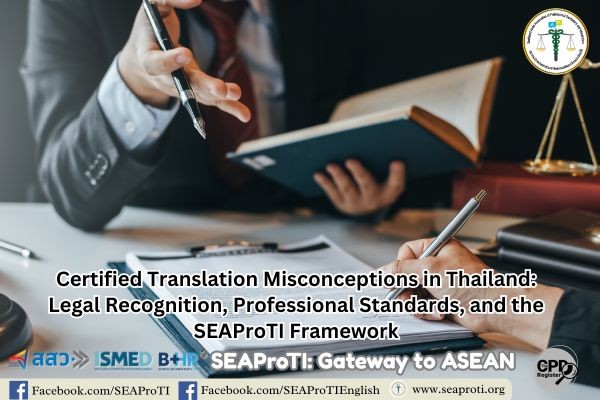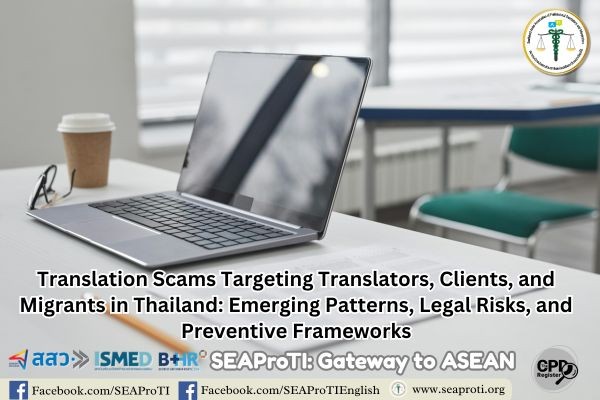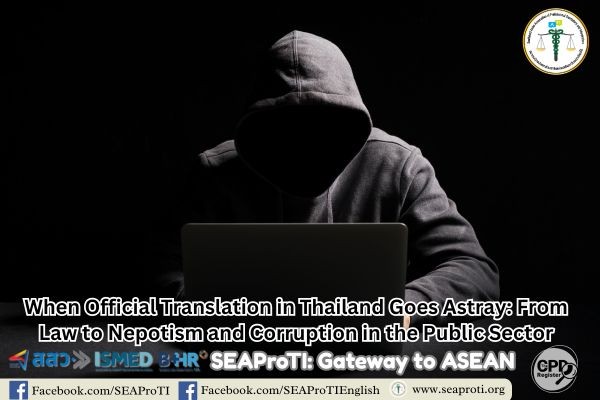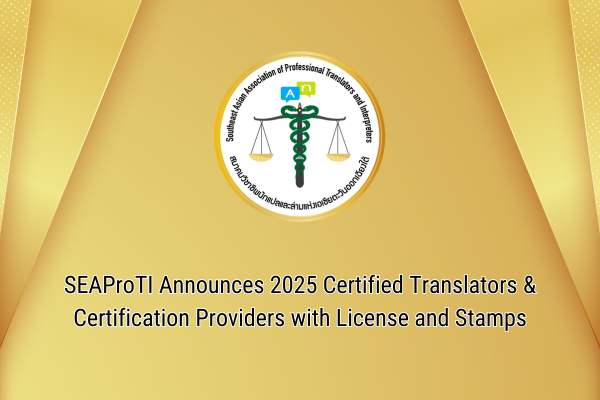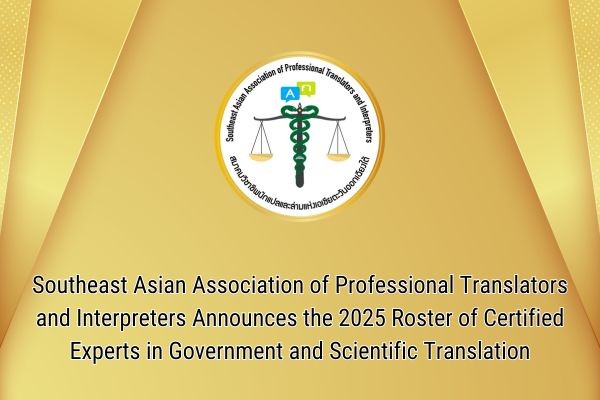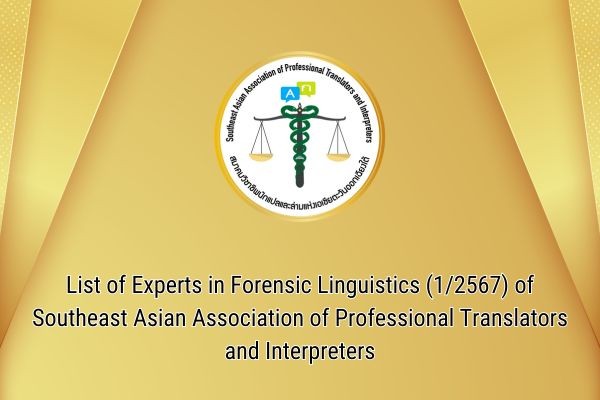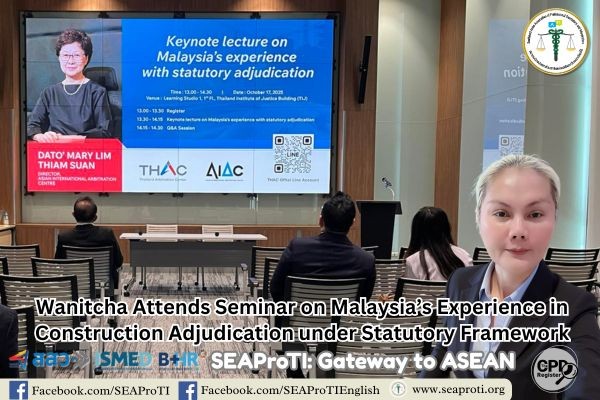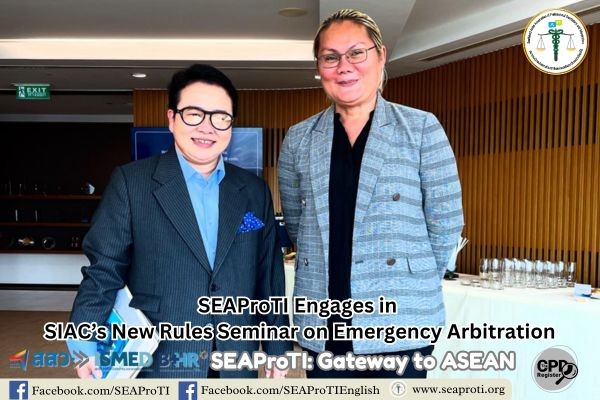SEAProTI-Certified Medical Interpreters: Pillars of Safety in Thailand’s Healthcare System
April 21, 2025, Bangkok – In examination rooms, emergency departments, or even operating theatres, precise communication is not just a “nice-to-have”—it’s a “must-have.” Especially when dealing with patients who speak a language different from medical personnel, the absence of professional medical interpreters can lead to serious consequences. Relying on untrained staff, family members, or unqualified bilingual individuals often results in misunderstandings that may cause incorrect diagnoses, improper medication dosage, or unnecessary surgery.
The Clear Solution: SEAProTI-Certified Medical Interpreters
The Southeast Asian Association of Professional Translators and Interpreters (SEAProTI) is a legally recognized professional association in Thailand. Its charter has been published in the Royal Thai Government Gazette under the Office of the Prime Minister. SEAProTI is responsible for establishing professional standards, ethics, and certification systems for translators and interpreters in Southeast Asia, especially in high-stakes sectors such as law, courts, and medicine.
SEAProTI-certified Medical Interpreters are professionals who have passed rigorous selection, specialized training, and formal assessments based on regional standards aligned with international human rights principles.
Why Choose SEAProTI-Certified Medical Interpreters?
1. Accuracy in Medical Communication
General interpreters may be able to translate individual terms, but SEAProTI-certified medical interpreters understand the full clinical and ethical context of each situation. For example:
-
They distinguish between “Type 1” and “Type 2” diabetes accurately.
-
They know how to explain what a “cyst” means in a way that helps patients understand the risks involved.
-
They can clearly convey treatment options and risks so that patients can make informed decisions.
2. Patient Safety
In multilingual societies like Thailand—home to many migrant workers from Myanmar, Laos, Cambodia, and Vietnam, as well as refugees and tourists—communication risks are high without qualified medical interpreters.
Certification from SEAProTI ensures that the interpreter assigned to a hospital or clinic is trained, prepared, and understands how to minimize risks and prevent patients from being denied access to proper care.
3. Respect for Human Rights
According to the World Health Organization (WHO) and the International Covenant on Economic, Social and Cultural Rights, the right to access health information in one’s own language is a fundamental human right.
SEAProTI-certified medical interpreters are trained in Medical Interpreting Ethics, which cover critical principles such as:
-
Maintaining patient confidentiality
-
Avoiding interference in clinical decision-making
-
Respecting patients’ beliefs and cultural backgrounds
-
Accurately conveying all information without personal judgment
This is a concrete way to uphold the dignity of every human being through language access.
Legal Standing of SEAProTI Certification
SEAProTI is established under Thailand’s Non-Profit Associations Act, with its charter legally announced in the Royal Gazette. Its certification holds legal weight and can be used as documentation to validate interpreter credentials in official procurement or public health procedures.
Certified interpreters must renew their credentials annually, provide evidence of continued professional development (CPD), and pass ongoing ethical evaluations conducted by SEAProTI’s Code of Ethics Committee.
Governance Advantages: Why Certified Interpreters Matter for Hospitals
Minimizing Legal Risk
Hospitals or clinics that use uncertified interpreters may face serious repercussions if communication failures lead to:
-
Malpractice lawsuits from patients or their families
-
Scrutiny from healthcare regulators or accreditation bodies
Hiring SEAProTI-certified interpreters demonstrates due diligence and can serve as a mitigating factor during investigations or internal audits.
Building Public Trust
When patients learn that a hospital provides certified interpreter services, it strengthens public confidence in the facility. It also enhances the hospital’s reputation as a fair, inclusive, and professional healthcare provider.
Case Study
A hospital in northeastern Thailand once relied on a factory employee to interpret for a migrant worker from Myanmar. The patient, a woman, failed to understand that she had an ectopic pregnancy. She refused emergency surgery and later died.
After this tragedy, the hospital partnered with SEAProTI-certified interpreters, leading to a marked reduction in communication errors and improved patient safety outcomes.
Conclusion: Empowering Healthcare with Quality and Ethics
SEAProTI-certified medical interpreters are more than just translators. They are bridges to understanding, safety, and human dignity.
They are essential to hospitals aiming to elevate service quality. They are a source of hope for patients seeking true understanding of their health conditions. They are a crucial force in protecting the right of all individuals to access equitable healthcare.
For Hospitals, Government Agencies, and NGOs:
If you’re looking to hire certified interpreters, connect with a SEAProTI-recognized medical interpreter center through SEAProTI.
SEAProTI’s certified translators, translation certification providers, and certified interpreters:
The Southeast Asian Association of Professional Translators and Interpreters (SEAProTI) has officially announced the criteria and qualifications for individuals to register as “Certified Translators,” “Translation Certification Providers,” and “Certified Interpreters” under the association’s regulations. These guidelines are detailed in Sections 9 and 10 of the Royal Thai Government Gazette, issued by the Secretariat of the Cabinet under the Office of the Prime Minister of the Kingdom of Thailand, dated July 25, 2024, Volume 141, Part 66 Ng, Page 100.
To read the full publication, visit: the Royal Thai Government Gazette
ล่ามทางการแพทย์ที่ได้รับการรับรองจาก SEAProTI: เสาหลักของความปลอดภัยในระบบสุขภาพไทย
21 เมษายน 2568, กรุงเทพมหานคร – ในห้องตรวจ ห้องฉุกเฉิน หรือแม้กระทั่งห้องผ่าตัด การสื่อสารอย่างแม่นยำไม่ใช่สิ่งที่ “ควรมี” แต่คือสิ่งที่ “ต้องมี” โดยเฉพาะเมื่อต้องติดต่อกับผู้ป่วยที่ใช้ภาษาต่างจากบุคลากรทางการแพทย์ หากใช้ผู้แปลภาษาที่ขาดทักษะทางการแพทย์ หรืออาศัยเพียงญาติหรือเจ้าหน้าที่ที่ไม่มีคุณสมบัติ อาจก่อให้เกิดความเข้าใจผิดที่นำไปสู่การรักษาที่ผิดพลาด การจ่ายยาผิดขนาด หรือการผ่าตัดที่ไม่จำเป็น
คำตอบที่ชัดเจน: ล่ามทางการแพทย์ที่ได้รับการรับรองจาก SEAProTI
สมาคมวิชาชีพนักแปลและล่ามแห่งเอเชียตะวันออกเฉียงใต้ (SEAProTI) คือองค์กรวิชาชีพที่มีสถานะเป็นนิติบุคคลตามกฎหมายของไทย มีข้อบังคับที่ประกาศในราชกิจจานุเบกษา สำนักนายกรัฐมนตรี โดยมีภารกิจในการกำหนดมาตรฐาน วิชาชีพ และจริยธรรมสำหรับนักแปลและล่ามในภูมิภาคเอเชียตะวันออกเฉียงใต้ โดยเฉพาะในสาขาที่มีผลกระทบสูง เช่น ศาล กฎหมาย และการแพทย์
ล่ามทางการแพทย์ที่ได้รับการรับรองจาก SEAProTI (SEAProTI-certified Medical Interpreters) เป็นผู้ที่ผ่านการคัดเลือก การฝึกอบรม และการสอบตามเกณฑ์ที่เป็นมาตรฐานระดับภูมิภาคและสอดคล้องกับหลักสิทธิมนุษยชนระหว่างประเทศ
เหตุผลที่ควรเลือกใช้ล่ามทางการแพทย์ที่ได้รับการรับรองจาก SEAProTI
1. ความแม่นยำในการสื่อสารทางการแพทย์
ล่ามทั่วไปอาจสามารถแปลได้ตามคำศัพท์ แต่ล่ามทางการแพทย์ที่ผ่านการรับรองจะเข้าใจทั้งบริบททางคลินิกและจริยธรรมของสถานการณ์ ตัวอย่างเช่น:
-
เข้าใจความแตกต่างระหว่าง “เบาหวานชนิดที่ 1” กับ “เบาหวานชนิดที่ 2”
-
รู้ว่าคำว่า “ซีสต์” ต้องอธิบายเพิ่มเติมอย่างไรเพื่อให้ผู้ป่วยเข้าใจอย่างปลอดภัย
-
สามารถถ่ายทอดแนวทางการรักษาหรือความเสี่ยงที่ผู้ป่วยต้องตัดสินใจได้อย่างครบถ้วน
2. ความปลอดภัยของผู้ป่วย
ในประเทศที่มีผู้ป่วยหลากหลายภาษา เช่น ไทย ซึ่งมีแรงงานข้ามชาติจำนวนมากจากเมียนมา ลาว กัมพูชา เวียดนาม รวมถึงผู้ลี้ภัยและนักท่องเที่ยว หากไม่มีล่ามที่มีความสามารถและจริยธรรมที่ถูกต้อง ย่อมเพิ่มความเสี่ยงด้านสุขภาพอย่างมาก
การรับรองโดย SEAProTI ช่วยให้บุคลากรแพทย์สามารถมั่นใจได้ว่า ล่ามที่มาทำหน้าที่ในโรงพยาบาลหรือคลินิก มีความพร้อมและรู้วิธีลดความเสี่ยง ไม่ทำให้ผู้ป่วยเสียโอกาสในการเข้าถึงบริการ
3. การเคารพในสิทธิมนุษยชน
ภายใต้หลักการขององค์การอนามัยโลก (WHO) และกติการะหว่างประเทศว่าด้วยสิทธิทางเศรษฐกิจ สังคม และวัฒนธรรม การเข้าถึงข้อมูลด้านสุขภาพในภาษาที่เข้าใจได้ คือสิทธิขั้นพื้นฐาน
ล่ามที่ผ่านการรับรองจาก SEAProTI ได้รับการฝึกอบรมด้านจริยธรรมล่ามทางการแพทย์ (Medical Interpreting Ethics) ซึ่งระบุไว้อย่างชัดเจนในเรื่องของ:
-
ความลับของข้อมูลผู้ป่วย
-
การไม่แทรกแซงทางจริยธรรม
-
การเคารพความเชื่อและวัฒนธรรมของผู้ป่วย
-
การถ่ายทอดข้อมูลอย่างครบถ้วนโดยไม่ตัดสิน
นี่คือการคุ้มครองศักดิ์ศรีความเป็นมนุษย์ผ่านการแปลภาษา
การรับรองจาก SEAProTI มีสถานะทางกฎหมาย
สมาคม SEAProTI ได้จัดตั้งขึ้นภายใต้พระราชบัญญัติสมาคมที่ไม่แสวงหากำไร และมีข้อบังคับที่ได้รับการประกาศในราชกิจจานุเบกษา สำนักนายกรัฐมนตรี การรับรองของ SEAProTI จึงเป็นไปตามระเบียบของทางราชการ และสามารถใช้เป็นหลักฐานประกอบการว่าจ้างล่าม หรือแนบในเอกสารราชการเพื่อแสดงความน่าเชื่อถือ
ล่ามที่ได้รับการรับรองจากสมาคมนี้ต้องต่ออายุสถานภาพสมาชิกและใบรับรองทุกปี โดยต้องแสดงหลักฐานการพัฒนาวิชาชีพอย่างต่อเนื่อง (CPD) และผ่านการประเมินจากคณะกรรมการจรรยาบรรณ
ข้อดีด้านธรรมาภิบาล: เมื่อโรงพยาบาลใช้ล่ามที่มีมาตรฐาน
ลดความเสี่ยงทางกฎหมาย
โรงพยาบาลหรือคลินิกที่ใช้ล่ามที่ไม่ผ่านการรับรอง อาจเผชิญปัญหาในกรณีที่เกิดความผิดพลาดจากการสื่อสาร เช่น
-
ถูกฟ้องร้องจากครอบครัวผู้ป่วยเนื่องจากการตัดสินใจที่ผิดพลาด
-
ถูกเพ่งเล็งจากหน่วยงานกำกับดูแลด้านสาธารณสุข
การเลือกใช้ล่ามที่ได้รับการรับรองจาก SEAProTI แสดงให้เห็นถึง “ความระมัดระวังตามสมควร” (due diligence) และสามารถใช้เป็นข้อแก้ต่างในการสืบสวนหรือการตรวจสอบภายในได้
สร้างความเชื่อมั่นให้กับประชาชน
เมื่อผู้ป่วยทราบว่าโรงพยาบาลมีการจัดบริการล่ามที่ได้รับการรับรอง ย่อมสร้างความมั่นใจในการเข้ารับบริการ และเสริมภาพลักษณ์ขององค์กรในฐานะหน่วยบริการสาธารณสุขที่เป็นธรรมและครอบคลุม
ตัวอย่างกรณีศึกษา
โรงพยาบาลแห่งหนึ่งในภาคตะวันออกเฉียงเหนือ เคยใช้เจ้าหน้าที่โรงงานเป็นล่ามให้แรงงานเมียนมา ผลคือผู้ป่วยหญิงไม่เข้าใจว่าตนเองตั้งครรภ์นอกมดลูก จึงปฏิเสธการผ่าตัดฉุกเฉินและเสียชีวิตในเวลาต่อมา
ต่อมาโรงพยาบาลจึงร่วมมือกับล่ามที่ได้รับการรับรองจาก SEAProTI และลดข้อผิดพลาดในการสื่อสารลงอย่างมีนัยสำคัญ
สรุป: เสริมพลังระบบสุขภาพ ด้วยล่ามที่มีคุณภาพและจรรยาบรรณ
ล่ามทางการแพทย์ที่ได้รับการรับรองจาก SEAProTI ไม่ใช่เพียงผู้แปลภาษา แต่เป็น “สะพานแห่งความเข้าใจ ความปลอดภัย และศักดิ์ศรี” เป็นทางเลือกของโรงพยาบาลที่ต้องการยกระดับมาตรฐานการให้บริการ เป็นความหวังของผู้ป่วยที่ต้องการความเข้าใจอย่างแท้จริง และเป็นพลังสนับสนุนสิทธิของทุกคนในการได้รับการดูแลสุขภาพอย่างเท่าเทียม
หากคุณคือผู้บริหารโรงพยาบาล หน่วยงานรัฐ หรือองค์กรพัฒนาเอกชนที่ต้องการจัดหาล่ามที่ผ่านการรับรอง ติดต่อศูนย์บริการล่ามที่ผ่านการรับรองจาก SEAProTI
เกี่ยวกับนักแปลรับรอง ผู้รับรองการแปล และล่ามรับรองของสมาคมวิชาชีพนักแปลและล่ามแห่งเอเชียตะวันออกเฉียงใต้
สมาคมวิชาชีพนักแปลและล่ามแห่งเอเชียตะวันออกเฉียงใต้ (SEAProTI) ได้ประกาศหลักเกณฑ์และคุณสมบัติผู้ที่ขึ้นทะเบียนเป็น “นักแปลรับรอง (Certified Translators) และผู้รับรองการแปล (Translation Certification Providers) และล่ามรับรอง (Certified Interpreters)” ของสมาคม หมวดที่ 9 และหมวดที่ 10 ในราชกิจจานุเบกษา ของสำนักเลขาธิการคณะรัฐมนตรี ในสำนักนายกรัฐมนตรี แห่งราชอาณาจักรไทย ลงวันที่ 25 ก.ค. 2567 เล่มที่ 141 ตอนที่ 66 ง หน้า 100 อ่านฉบับเต็มได้ที่: นักแปลรับรอง ผู้รับรองการแปล และล่ามรับรอง


